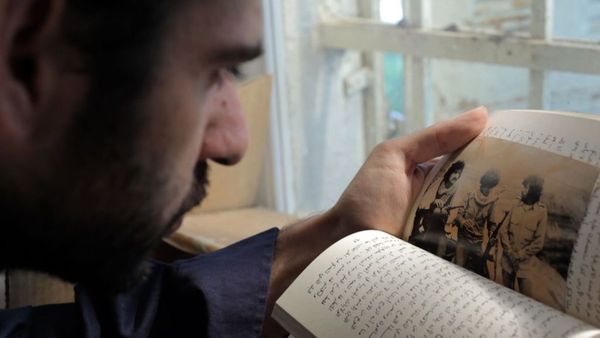
(AFP PHOTO / AHMED TARANA)
Police forces arrested 24 people on Saturday evening during a demonstration against the Protest Law and that called for the release of those who had been detained for violating it.
The protest was heading to Itihadiya Presidential Palace. The protesters, numbering around 500, changed their route when they found “intensified security forces”, according to journalist and 6 April member Ali Halaby.
The protest was organised by the family of imprisoned activist Alaa Abd el-Fattah, including his sister Sanaa Seif, who herself was arrested during the protest on Saturday.
The Way of the Revolution Front, 6 April Youth Movement, the Revolutionary Socialists, Misr Al-Qawia and Al-Dostour Party were among the groups participating in the protest.
The 6 April Movement (Democratic Front) said in Saturday statement that security forces had been aided by thugs who were armed with melee weapons, teargas, and birdshot, to “terrorise innocent people and assault peaceful youth.”
Muslim Brotherhood members were not allowed to join the protest, the group added.
The Ministry of Interior’s media office said that between 60 and 70 persons assembled in Salah Al-Deen and Al-Ismailia Squares and blocked the road, causing traffic. The protesters and the residents in the area then began to pelt each other with rocks, prompting security forces to intervene
Twenty-four of the demonstrators were detained, including Yara Sallam, a human rights researcher and the winner of the African Shield Human Rights Defenders in 2013.
Four people were arrested from the 6 April Movement (Democratic Front), while two were arrested from the Al-Dostour Party.
They are facing charges of violating the Protest Law, blocking roads, and damaging public and private property, including allegedly damaging a police vehicle and a shop window.
Association for Freedom of Thought and Expression lawyer Mokhtar Mounir said that t additional charges against the detainees include show of force, use of violence, and possession of explosives without a licence.
Eight journalists and six youth were also arrested Saturday, but were later released, according to lawyer Amr Imam.
“The Ministry of Interior insists on being the police of the regime not the police of the people,” said the 6 April movement in Saturday’s statement.
The Arabic Network for Human Rights Information(ANHRI) condemned the arrest of the journalists and protestors, saying that the Egyptian authority continues to use repression towards protestors, and employs the Protest law as a mechanism to stifle its opponents and pack its prisons with dissidents.
ANHRI called for the release of all those who were arrested from Saturday’s protest, as well as all those arrested in light of the Protest Law, and dropping all charges against them, and dropping the “repressive” law. It called for respecting the citizens’ right of freedom of expression peacefully.
The Misr Al-Qawia (Strong Egypt) party also announced its solidarity with those who were arrested Saturday and all political detainees in Egypt’s prisons.
The party issued a statement on Sunday criticizing the authority’s refusal to consider other opinions and its annoyance with any opposition even if it is peaceful, and condemned the protest law as ”unconstitutional”, given that the current constitution it was issued under the same authorities guaranteeing the right to peaceful protest.
Eight political parties held a meeting Saturday noon at Al-Tayar Al-Sha’aby (The Popular Current)’s headquarters to condemn the Protest Law and announce their refusal of sentences handed to youth. On top of which was the Shura council case which Abdel Fattah and 24 others received sentences of 15 years in prison and were fined EGP 100,000 on 11 June.
Among the parties that attended were the Al-Dostour party, the Egyptian Social Democratic Party and the Popular Socialist Alliance.
On Tuesday, the Administrative Court permitted an appeal for the controversial Protest Law before the Supreme Constitutional Court (SCC). A lawsuit had been filed by the Egyptian Centre for Social and Economic Rights (ECESR), an NGO directed by lawyer Khaled Ali and a law centre named the Centre to Support the Rule of Law, directed by lawyer Tarek Al-Awady.
The Protest Law was issued by Hazem El-Beblawi’s cabinet last November to regulate protests, requiring permission from the Ministry of Interior to organise demonstrations. It was then retracted for public discussion, and approved in late November 2013 by former interim president Adly Mansour.
The legislation includes restrictions on protests, marches and public meetings and requires a three-day notice in order to hold a protest. It allows the interior minister to move or change the route of assemblies, or cancel them.
Articles in the Protest Law also allow security forces to use water cannons, batons and teargas to disperse protesters, as well as “escalatory measures”, including the use of rubber bullets and metal pellets.
Saturday was named the “International Day of Solidarity with Egyptian Detainees”, an initiative to support detainees by demonstrating in front of Egyptian embassies in London, Paris, Berlin, and other cities.


